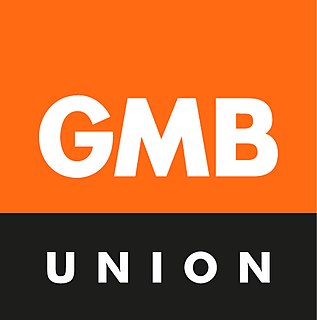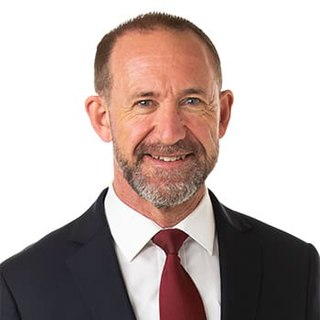
The GMB is a general trade union in the United Kingdom which has more than 600,000 members. Its members work in nearly all industrial sectors, in retail, security, schools, distribution, the utilities, social care, the National Health Service (NHS), ambulance service and local government.

Service Employees International Union (SEIU) is a labor union representing almost 1.9 million workers in over 100 occupations in the United States and Canada. SEIU is focused on organizing workers in three sectors: healthcare, including hospital, home care and nursing home workers; public services ; and property services.
Maruti Suzuki India Limited, formerly known as Maruti Udyog Limited, is a subsidiary of the Japanese automotive manufacturer Suzuki. It was founded and owned by the Government of India between 1981 until 2003. It was sold to Suzuki Motor Corporation by Government of India in 2003. As of July 2018, it had a market share of 53 percent in the Indian passenger car market.

Mark James Gosche is a New Zealand politician. He is a member of the Labour Party. He was born in Auckland to Samoan parents, and has been active in New Zealand's Pacific Islander community.

Suzanne Mary Moroney, generally known as Sue Moroney, is a New Zealand politician. She is a member of the New Zealand Labour Party and was a Member of Parliament from 2005 general election until her retirement in 2017.

The New Zealand Council of Trade Unions is a national trade union centre in New Zealand. The NZCTU represents 360,000 workers, and is the largest democratic organisation in New Zealand.
The Engineering, Printing and Manufacturing Union (EPMU) was the largest private sector trade union in New Zealand. It was formed in 1996 by the merger of the Engineers' Union (EU), the Printing, Packaging and Manufacturing Union (PPMU), and the Communications and Energy Workers' Union (CEWU).

Andrew James Little is a New Zealand politician and former trade union official currently serving as Minister of Health and Minister for Treaty of Waitangi Negotiations. He is also the Minister for the Government Communications Security Bureau and the New Zealand Security Intelligence Service. Little was previously Leader of the Opposition from 2014 to 2017.

The Third Labour Government of New Zealand was the government of New Zealand from 1972 to 1975. During its time in office, it carried out a wide range of reforms in areas such as overseas trade, farming, public works, energy generation, local government, health, the arts, sport and recreation, regional development, environmental protection, education, housing, and social welfare. Māori also benefited from revisions to the laws relating to land, together with a significant increase in a Māori and Island Affairs building programme. In addition, the government encouraged biculturalism and a sense of New Zealand identity. The government lasted for one term before being defeated a year after the death of its popular leader, Norman Kirk.

The First Labour Government of New Zealand was the government of New Zealand from 1935 to 1949. Responsible for the realisation of a wide range of progressive social reforms during its time in office, it set the tone of New Zealand's economic and welfare policies until the 1980s, establishing a welfare state, a system of Keynesian economic management, and high levels of state intervention. The government came to power towards the end of, and as a result of, the Great Depression of the 1930s, and also governed the country throughout World War II.

The 2007 Spotless dispute was an industrial dispute between contracting company Spotless and 800 of their employees working at various hospitals around New Zealand and represented by the Service & Food Workers Union.
Labour in India refers to employment in the economy of India. In 2020, there were around 501 million workers in India, the second largest after China. Out of which, agriculture industry consist of 41.19%, industry sector consist of 26.18% and service sector consist 32.33% of total labour force. Of these over 94 percent work in unincorporated, unorganised enterprises ranging from pushcart vendors to home-based diamond and gem polishing operations. The organised sector includes workers employed by the government, state-owned enterprises and private sector enterprises. In 2008, the organised sector employed 27.5 million workers, of which 17.3 million worked for government or government owned entities.
Indian labour law refers to laws regulating labour in India. Traditionally, Indian government at federal and state level have sought to ensure a high degree of protection for workers, but in practice, this differs due to form of government and because labour is a subject in the concurrent list of the Indian Constitution.

The Irish Congress of Trade Unions, formed in 1959 by the merger of the Irish Trades Union Congress and the Congress of Irish Unions, is a national trade union centre, the umbrella organisation to which trade unions in both the Republic of Ireland and Northern Ireland affiliate.
The gender pay gap in New Zealand is the difference in the median hourly wages of men and women in New Zealand.In 2020 the gender pay gap is 9.5 percent. It is an economic indicator used to measure pay equality. The gender pay gap is an official statistic published annually by Stats NZ sourced from the Household Labour Force Survey.

Terranova Homes, also styled as TerraNova Homes and sometimes referred to as Terranova v Bartlett, was a decision of the New Zealand Court of Appeal concerning equal pay in New Zealand, and turned on the interpretation of the Equal Pay Act 1972, which was enacted in response to the 1971 report of the Commission of Inquiry into Equal Pay. It was alleged that the wages paid by TerraNova Homes & Care Ltd (TerraNova) to its caregivers were lower than they would be if care giving of the aged were not work predominantly performed by women. O’Regan P, Stevens and French JJ upheld the Employment Court’s decision in Service and Food Workers Union Nga Ringa Tota Inc v TerraNova Homes and Care Ltd that TerraNova was discriminating against its female employees. The Court of Appeal dismissed the appeal, although they thought that the issue was more "finely balanced" than the Employment Court had illustrated in its decision.

Kristine Robyn Bartlett is an aged care worker from Lower Hutt, New Zealand.

The Sixth Labour Government has governed New Zealand since 26 October 2017. It is headed by Labour Party leader and Prime Minister Jacinda Ardern.

Indian migrant workers during the COVID-19 pandemic have faced multiple hardships. With factories and workplaces shut down due to the lockdown imposed in the country, millions of migrant workers had to deal with the loss of income, food shortages and uncertainty about their future. Following this, many of them and their families went hungry. Thousands of them then began walking back home, with no means of transport due to the lockdown. In response, the Central and State Governments took various measures to help them, and later arranged transport for them. 198 migrant workers died due to the lockdown, with reasons road accidents.
Elizabeth Welch Orr was a New Zealand lecturer and a previous Chancellor of Victoria University of Wellington. Orr was also a trade union leader and advocate for pay equity.














